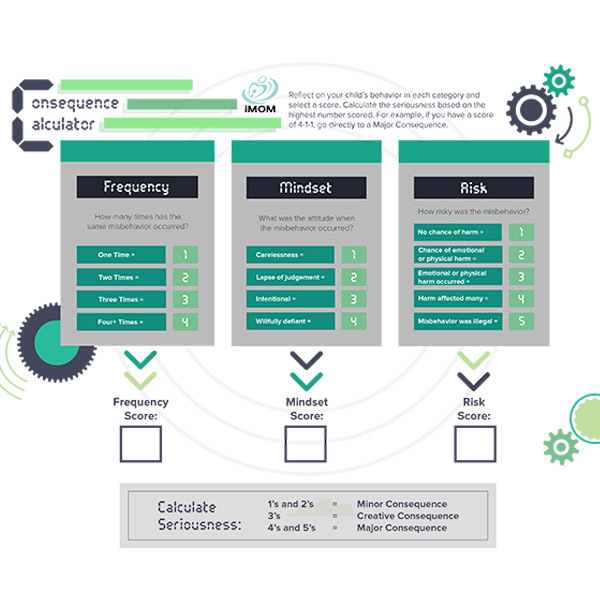You’ve probably heard of the five love languages, Dr. Gary Chapman’s way of helping people figure out how to show love to others. Well, Dr. Chapman is more than a love guru; he also has great insight into parenting. He says there are four principles we should follow when disciplining children. He calls them creative correction.
“In a loving family,” he says, “parents give correction when needed. But it is important that correction is given creatively. Remember: our goal is to teach in such a way as to whet the appetite. We want to stimulate the child to positive behavior. Correction can be given negatively or positively.”
Here are Dr. Chapman’s 4 principles of creative correction. They’ll help you strengthen your positive discipline techniques and lovingly and effectively grow your parenting approach.
 1. Don’t correct behavior that doesn’t need correcting.
1. Don’t correct behavior that doesn’t need correcting.
In our efforts to teach our children, we sometimes stifle creativity in favor of conformity. Creativity is the wonderful gift of thinking outside the lines. It is our creativity that allows us to develop the uniqueness implanted within each of us. To stifle this creativity is to make children look like cookies rather than snowflakes. In a healthy family, we seek to correct only the kinds of behaviors that are destructive and detrimental to the child’s development. We are not trying to destroy the child’s unique expression of creativity. A good question for parents to ask is, “Is the behavior I am about to correct truly destructive to my child? Will it be detrimental to his future if I allow it to continue?” If the answer is yes, then correction is in order. If the answer is no or if you are uncertain, then it is time to explore the child’s behavior further.
Creativity is the wonderful gift of thinking outside the lines. Click To Tweet2. Correct out of love, not out of controlled anger.
Love seeks the child’s well-being and believes that the correction given is for their long-term benefit. Expressions of uncontrolled anger are simply the venting of our frustration and may be extremely destructive to the child. I am not suggesting that a parent should never feel anger toward a child. That is unrealistic. Anger is the emotion that arises inside of us when we perceive that the child has done wrong, such as when he refuses to follow our instruction or interprets our no as a maybe that could turn into a yes if he pleads with us long enough.
Anger is a perfectly normal and often wholesome emotion. Its purpose is to motivate us to take constructive action; however, parents often allow their anger to go unchecked and end up with destructive words and behavior. If you feel anger toward your child and believe that the child needs correction, you will do far better to restrain your initial response, give yourself time to cool down, and then come back to verbally correct the child and give further discipline if needed.
Love asks the essential question, “Is the correction I am about to give for the benefit of my child (or the entire family/community)?” It is this reality that must be communicated to the child in efforts to correct. “I love you a whole lot and I want to see you live to adulthood. Therefore, you must never again ride your bicycle without a helmet. Understand?”
3. Correct without belittling.
Typically, a tongue-lashing does not correct behavior. Rather, it ostracizes children. As soon as the child is old enough to understand, we should seek to explain the wrong behavior and give instructions for the future. Our purpose is not to humiliate the child by calling him names; our purpose is to correct the child so that he can become a responsible individual. To call a child stupid reveals more about our intelligence than it does about the child. No thinking adult would wish to communicate such an idea to a child. This does not mean that if we have reverted to such name-calling that we are forever dysfunctional parents. It means we must take action to confess our wrongdoing to the child.
I am sorry I lost my temper, and I am especially sorry that I called you ‘stupid’ because that is not true. You are a very intelligent person. I am the one who was unwise in using that word. I was upset, and I failed to get control of myself before I started talking. I want to ask you to forgive me. I want to help you become even a wiser person than you are, and I want to continue learning how to be a good father.
These are the words of a wise father indeed. Children are willing to forgive failure if we are willing to admit it.
4. Deal only with the matter at hand.
We do not bring up past failures. To parade before a child all of his past failures before you correct him for his current failure is to communicate that he must indeed be a failure. How many times did Edison fail before he invented the lightbulb? No one calls Edison a failure, although he failed far more often than he succeeded. Your child may be an Edisonite. Don’t discourage him by parading his past failures before him.
What principles would you add to this list and why?
Taken with permission from The Family You’ve Always Wanted by Dr. Gary Chapman.











